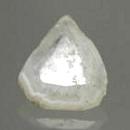|
Click on a letter above to view the list of gems. |
|
|
|
|
|
|
|
|
Epididymite
|
|
| | |
| Discovered in 1893; IMA status: Valid (pre-IMA; Grandfathered) | ||
|
| ||
|
Chemistry |
|
|
| |
|
NaBeSi3O7(OH) | |
|
|
Sodium Beryllium Silicate Hydroxide |
|
Molecular Weight: |
245.26 gm |
|
Composition: |
Sodium |
9.37 % |
Na |
12.64 % |
Na2O |
|
|
Beryllium |
3.67 % |
Be |
10.20 % |
BeO |
|
|
Silicon |
34.35 % |
Si |
73.49 % |
SiO2 |
|
|
Hydrogen |
0.41 % |
H |
3.67 % |
H2O |
|
|
Oxygen |
52.19 % |
O |
|
|
|
|
|
100.00 % |
|
100.00 % |
= TOTAL OXIDE |
|
|
|
||||
|
Classification |
|
|
| |
|
Silicates (Germanates) | |
|
8/G.04-20 | |
|
|
9 : SILICATES (Germanates) |
|
Related to: |
Dimorphous with Eudidymite. |
|
Synonyms: |
Epidymite |
|
|
|
|
Crystal Data |
|
|
|
|
|
As pseudohexagonal crystals, tabular on {001}, also elongated along [010], to 6 cm. Micaceous, spherulitic, fine to coarse granular, porcelaneous massive. |
|
|
On {001}, common, simple and polysynthetic; also as trillings. |
|
|
|
|
|
Physical Properties |
|
|
|
|
|
Perfect on {001}, Distinct on {100} |
|
|
Uneven to Conchoidal when massive |
|
|
Brittle |
|
|
5.5 |
|
|
2.55 - 2.61 (g/cm3) |
|
|
None |
|
|
Not Radioactive |
|
|
|
|
|
Optical Properties |
|
|
|
|
|
Colorless, White, also tinted Violet, Blue, or Yellow when finely crystalline |
|
|
Transparent to Translucent |
|
|
Vitreous on fractures, Pearly on cleavages |
|
|
1.536 - 1.546 Biaxial ( + ) or ( - ) |
|
|
0.0020 |
|
|
Weak |
|
|
|
|
|
Occurances |
|
|
|
|
|
Geological Setting: |
A late-stage mineral in nepheline syenite pegmatites. |
|
Common Associations: |
Aegirine, Albite, Analcime, Elpidite, Eudialyte, Leucophanite, Natrolite, Neptunite, Tugtupite |
|
Common Impurities: |
Al, Fe, Mg, Ca, K |
|
Type Locality: |
Narss‚rssuk pegmatite (Narsarsuk pegmatite), Narss‚rssuk (Narsarsuk), Igaliku (Igaliko), Narsaq, Kitaa (West Greenland) Province, Greenland |
|
Year Discovered: |
1893 |
|
View mineral photos: | |
|
|
|
|
More Information |
|
|
|
|
|
| |
|
|
|
|
Epididymite
is found in locations that are famous agpaitic pegmatite
sites like Kola Peninsula, Russia; Mont Saint-Hilaire,
Canada; ArÝ Island, Langesundfjord,
Norway and Narss‚rssuk,
Greenland. These are all well known locations for rare
silicate minerals. Other Epididymite locations include
Vevja quarry, Tvedalen, Norway;
VeznŠ, Czech Republic; near Saint-Amable, Quebec, Canada;
near
Quincy, Norfolk County, Massachusetts, USA; and large crystals on
Mt. Malosa, Zomba district, Malawi. |
|
|
We
have not photographed our Epididymite gems. Please
check back soon. |
